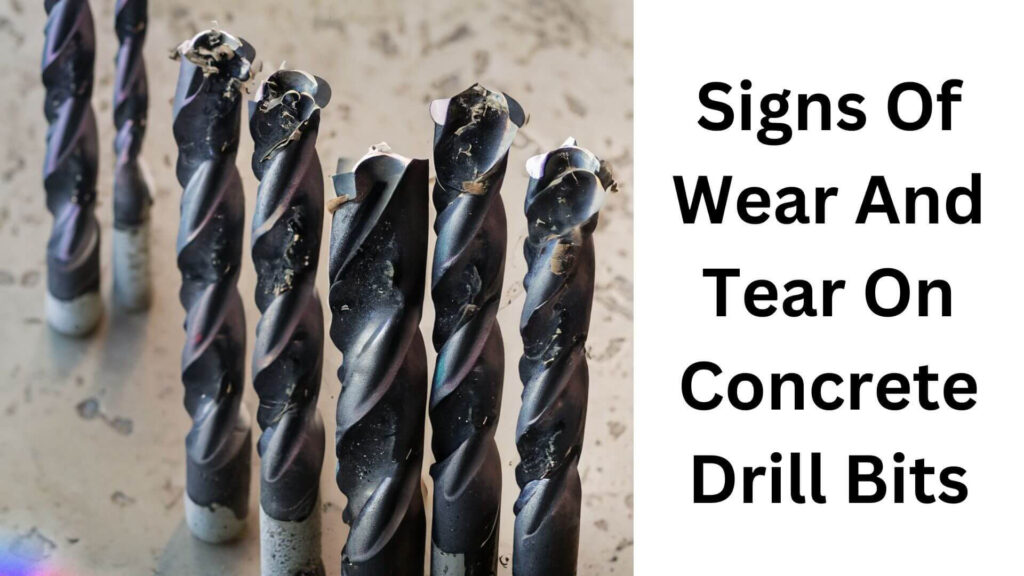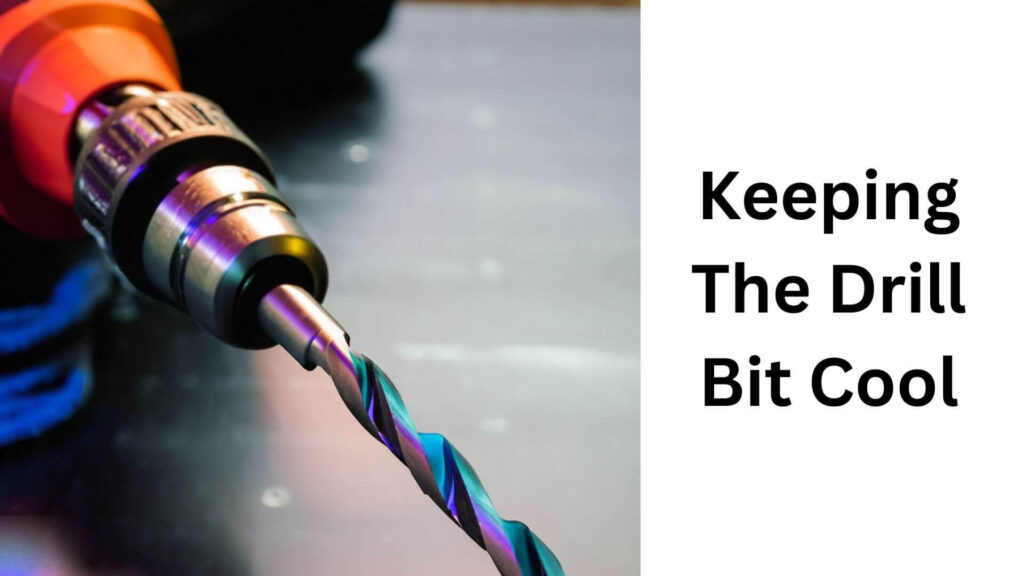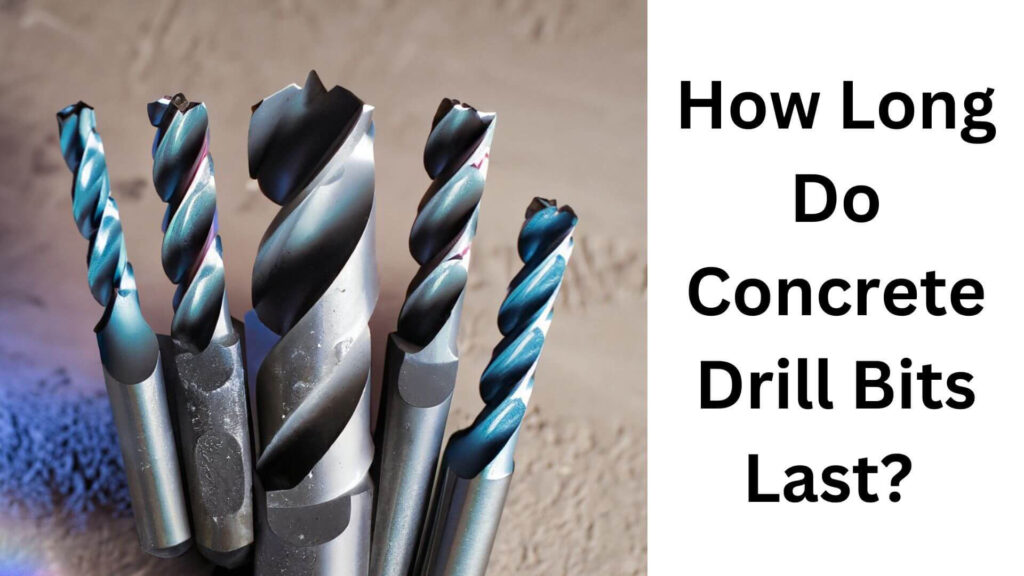Attention homeowners, contractors, and DIY enthusiasts! Are you tired of investing in concrete drill bits only to see them wear out too soon? The question on everyone’s minds is, “How long do concrete drill bits last?”
Concrete drill bits can last up to 500 holes. Concrete is a durable material that requires strong drill bits to create cavities.
The lifespan of concrete drill bits largely depends on the material quality, frequency of use, operating speed, and contact with hard and abrasive surfaces like rebar.
A high-quality carbide drill bit can drill roughly 150- 200 holes in concrete with proper care. In contrast, a diamond-tipped drill bit can drill up to 500 holes in reinforced concrete. Similarly, a coated or abrasive-coated drill bit has a shorter lifespan than a solid carbide bit.
So, choosing the right drill bit for the purpose and ensuring appropriate use and maintenance is essential to prolong its life and improve performance.
In this article, I will explore the factors affecting the lifespan of concrete drill bits and how to extend them.
Read More: Can Concrete Drill Bits Be Sharpened?
Table of Contents
Understanding The Basics Of Concrete Drill Bits
Concrete drill bits are an essential tool in construction work. They are used to drill concrete, masonry, and other hard materials. Like every other tool, they wear out after a certain period. By the end of this article, you will understand how long concrete drill bits last.
Definition Of A Concrete Drill Bit
A concrete drill bit is a cutting tool used to drill holes in concrete, brick, and dense masonry. These drill bits are typically made from high-speed steel or carbide. Depending on the intended use, concrete drill bits come in different sizes and diameters.
Anatomy Of A Concrete Drill Bit
A concrete drill bit consists of several parts that work together to drill holes in concrete or masonry. The parts include:
- Shank: This is the part of the drill bit that goes into the drill chuck.
- Flute: The flute is the spiral-shaped groove that runs down the length of the drill bit. It removes debris as the bit spins.
- Body: The body is the cylindrical part of the drill bit that does the drilling.
- Tip: The tip is the pointed end of the drill bit that first touches the drilled material.
Types Of Concrete Drill Bits
There are several types of concrete drill bits, including:
- Masonry drill bits: These are designed for drilling into soft materials like brick and concrete blocks.
- Hammer drill bits: These are used with a hammer drill to drill into hard materials like solid concrete.
- Diamond drill bits: These are used for drilling into rigid materials like granite and marble.
- Carbide-tipped drill bits: These have a carbide tip that can last longer than high-speed steel drill bits.
Understanding the basics of concrete drill bits is crucial in determining how long they last. Choosing the correct type of drill bit for the job ensures that it stays longer and saves money in the long run.
Whether you’re a professional or a DIY enthusiast, knowing the basics of concrete drill bits is essential.
Read More: Characteristics of Concrete Drill Bits
5 Factors Affecting The Lifespan Of Concrete Drill Bits
Concrete drill bits are essential in the construction industry, used to create holes in hard and durable surfaces. With the rise of technology, the efficiency and lifespan of concrete drill bits have improved significantly, making it a wise investment for construction companies.
Here will discuss the various factors that can affect the lifespan of concrete drill bits.
1. Material Quality
The quality of the materials used to create the drill bits is a critical factor in determining the lifespan of the drill bits.
Generally, drill bits with higher-quality materials last longer than those with lower-quality materials.
High-quality drill bits are usually made with high-speed or cobalt steel, providing abrasion resistance and durability.
Diamond-tipped drill bits are also becoming increasingly popular for improved performance but can be expensive.
2. Usage Frequency And Intensity
The frequency and intensity of usage can also affect the lifespan of concrete drill bits. For example, drill bits that are frequently used and drilled into challenging surfaces tend to wear out faster than those that are occasionally used and drilled into softer surfaces.
Additionally, the usage intensity, such as the speed and pressure applied while drilling, can cause the drill bits to wear out faster.
Therefore, using the drill bits appropriately and ensuring they cool down between usages is essential to avoid overheating.
3. Type Of Concrete Being Drilled
The type of concrete being drilled also plays a vital role in how long concrete drill bits last. Different types of concrete have varying densities, strengths, and compositions that directly impact the lifespan of the drill bits.
For instance, drilling into reinforced or pre-stressed concrete requires higher-quality drill bits made with cobalt steel or diamond-tipped, as the concrete’s density is much higher and denser.
On the other hand, drilling into regular concrete can be done with high-speed steel drill bits.
4. Speed And Pressure Applied While Drilling
The speed and pressure applied during drilling can affect the lifespan of concrete drill bits if excessive pressure or speed is applied while drilling, the drill bits can wear out or dull faster.
It is crucial to apply the right amount of pressure while drilling and use the correct speed to avoid overheating the drill bits.
5. Maintenance And Care
Finally, the maintenance and care of concrete drill bits directly impact their lifespan. Proper storage, cleaning, and correct usage ensure the drill bits last longer.
Carrying out regular maintenance, such as cleaning the drill bits after use, sharpening them when they become dull, and lubricating them, is crucial to improving their durability. Additionally, storing the drill bits in a dry and cool place will help prevent rusting and corrosion.
Concrete drill bits’ lifespan depends on various factors, including the material quality, frequency and intensity of usage, type of concrete being drilled, speed and pressure applied, and maintenance and care.
Adhering to these factors is critical to improving drill bits’ lifespan and ensuring the construction industry runs smoothly.
Read More: Suitability of Titanium Drill Bits for Concrete Drilling
Signs Of Wear And Tear On Concrete Drill Bits

1. The Reality Of Signs Of Wear And Tear On Concrete Drill Bits
Concrete drill bits are essential for contractors and DIY enthusiasts involved in drilling projects. Whether you are drilling holes into concrete, stone, or brick, it is crucial to understand the lifespan of these drill bits and detect signs of wear and tear.
If you continue drilling with worn-out bits, the bits can become ineffective, increasing the risk of extreme damage. So, how do you detect wearing signs in your concrete bits? We address just that.
2. Dullness
Dullness is one of the most apparent signs of a worn-out concrete drill bit. If you notice that your drill bit is taking longer to drill through or you are exerting more pressure than usual to drill holes, the bit is likely to dull.
Here are some other common signs of dullness in your concrete drill bit:
- The bit appears dulled or worn out;
- The tip of the bit has lost its point;
- The bit is producing more dust than usual.
- Avoid using your concrete drill bit on hard surfaces such as metal, glass or tiles to avoid dullness.
3. Chipping And Cracking
Chipping and cracking in your concrete drill bits can occur over time, mainly if you use them on hard surfaces like granite and reinforced concrete. Here are some signs of a chipped or cracked bit:
- The drill bit tip has chipped or cracked, producing rough edges;
- You need to apply excessive force to drill through, increasing the fracture risk.
- Avoid using too much pressure on your drill bit to prevent chipping or cracking.
4. Overheating
Another common wear sign on concrete drill bits is overheating. Overheating occurs when the bits’ temperature rises beyond normal levels during prolonged drilling, leading to increased wear on the bits. Here are some common signs of overheating in a drill bit:
- Your bit breaking due to excess heat generated;
- Reduced drilling efficiency;
- The bit is producing smoke.
- To prevent overheating, keep your bits sharp, use them at high revolutions per minute (rpm), and avoid drilling at an angle.
5. Increased Drilling Resistance
The final sign of wear on concrete drill bits is increased drilling resistance. If your drill bit has to force its way through the material instead of quickly and efficiently drilling, it is a sign of increased resistance, likely caused by wear and tear.
Here are some other signs of increased drilling resistance:
- The drilling process slows down;
- The machine’s motor struggles to function properly;
- The bits are producing an unpleasant grinding noise.
- To avoid increased drilling resistance, replace your bits frequently, and avoid using them on hard surfaces, which can produce wear and tear.
Concrete drill bits are crucial tools that require proper care and attention. By following the tips above, you will extend the life of your bits and make your drilling projects more efficient.
Always remember to detect signs of wear and tear, particularly with these signs: dullness, chipping and cracking, overheating, and increased drilling resistance.
Ways To Extend The Life Of Concrete Drill Bits
Concrete drill bits are essential tools that make drilling through solid concrete possible. However, they can wear out quickly if not used and maintained correctly, resulting in additional expenses. With proper care, extending these tools’ lifespan is possible.
Here I will outline some ways to help you get more use out of your concrete drill bits.
Keeping The Drill Bit Cool

The heat generated during use is an essential factor affecting the lifespan of concrete drill bits. The heat generated can cause the bit to wear down quickly and become unusable. Here are some tips to help keep your drill bit cool:
- Use a coolant or some form of lubricant while drilling to dissipate heat and reduce friction.
- Stop drilling periodically, especially during extended drilling sessions, to allow the bit to cool down.
- Avoid drilling at high speeds, as this generates more heat. Instead, always stick to the recommended drilling speeds for the bit.
Using Proper Techniques When Drilling
Using the proper techniques while drilling helps keep the drill bit in good shape for a long time. Here are some factors to consider:
- Start drilling gradually to allow the bit to penetrate the surface slowly. This prevents it from getting damaged or warped due to too much pressure.
- Always apply consistent pressure when drilling, and avoid tilting the drill tool.
- Keep the drill bit vertical when drilling, as it reduces unnecessary wear and tear, giving it a longer lifespan.
Maintenance And Care For Longevity
Maintaining and caring for your concrete drill bit goes a long way in extending its lifespan. Here are some critical steps to take:
- Clean the drill bit with a brush and water after every use.
- Store the drill bit properly, away from direct sunlight, moisture, and harsh conditions.
- Sharpen the drill bit regularly or replace it when it’s blunt or damaged.
- Use the correct drill bit for the job. Using a smaller or larger drill bit than needed can damage the tool, reducing its lifespan.
Extending the lifespan of your concrete drill bits is simple if you follow the proper steps. Adhering to the correct drilling techniques, maintaining and caring for the drill bit, and keeping it cool all contribute to a longer lifespan.
Incorporating these practices into your drilling sessions will help you save money in the long run, reducing the risk of expenses from frequently replacing your concrete drill bits.
When To Replace Concrete Drill Bits
Concrete drill bits are vital for drilling through concrete or other hard materials. They have specialised designs engineered to bore through harsh surfaces, making them popular among DIY enthusiasts, construction workers, and other professionals.
However, concrete drill bits tend to wear out over time, like all tools.
How To Determine When A Drill Bit Has Reached The End Of Its Life
Knowing when your concrete drill bits have become too worn out to be effective is essential. Here are some signs that you should look out for when evaluating the lifespan of your drill bits:
- Dullness: If your drill bits have become dull and can no longer create a clean hole, it’s time to replace them.
- Chipping: If the tip of your drill bit has chipped or broken off, it’s no longer functional and must be replaced.
- Smoking or melting: If you notice your drill bits smoke or melt while drilling, they are overheating and need to be replaced.
- Reduced performance: If you struggle to drill new holes or take longer than usual to cut through concrete or other hard surfaces, it’s another indication that your drill bits have worn out.
Importance Of Replacing Worn-Out Drill Bits
It’s crucial to replace worn-out concrete drill bits for a variety of reasons, some of which include the following:
- Safety: Worn-out drill bits can lead to dangerous situations, such as the drill bit breaking off mid-way through drilling or materials shattering and potentially causing injuries.
- Efficiency: Worn-out concrete drill bits affect the efficiency of your work. They not only slow down the drilling process but also make the task more challenging than it should be.
- Quality: Worn-out drill bits can create uneven holes or cause cracks, affecting your work’s quality.
Cost Considerations When Replacing Bits
When replacing drill bits, the cost is always an essential factor. Depending on the brand of the drill bit and the condition of your tool, you may want to consider some of the following cost considerations:
- Quality: Cheaper drill bits may be more affordable, but they tend to wear out faster and produce substandard work. Investing in high-quality drill bits may be more expensive, but they tend to last longer and save you money in the long run.
- Re-sharpening: Some drill bit brands allow you to re-sharpen your bits instead of buying new ones. Re-sharpening is more cost-effective than replacing a worn-out drill bit.
- Quantity: Purchasing drill bits in bulk also helps reduce the average cost per bit.
Knowing when to replace your concrete drill bits is crucial to ensure your work is efficient, safe, and high-quality.
While costs must be considered, investing in high-quality bits and proper maintenance practices can extend the lifespan of your drill bits and save you money in the long run.
Frequently Asked Questions On How Long Do Concrete Drill Bits Last
How Often Do I Need To Replace My Concrete Drill Bits?
It depends on your usage but typically needs to be replaced after 75-100 holes.
What Factors Affect The Lifespan Of My Concrete Drill Bits?
The material and thickness of the drill bits, the hardness of the concrete, and your drilling technique.
How Can I Extend The Lifespan Of My Concrete Drill Bits?
Use the correct drilling techniques, avoid overheating the bit, and keep the bit clean.
Can I Sharpen My Concrete Drill Bits?
No, it is not recommended, as it can damage the structural integrity of the bit.
How Do I Know When My Concrete Drill Bit Needs To Be Replaced?
If the bit is overheating, taking longer to penetrate the concrete, or producing poor-quality holes, it may be time to replace it.
Last Remarks
To sum up, concrete drill bits are great tools that can last for years if used and maintained correctly. The lifespan of a substantial drill bit depends on various factors, such as the quality of the tool, the material being drilled, drilling speed, coolant usage, and the operator’s experience.
As we have discussed, using a dull bit, applying too much pressure, and overheating it can shorten its lifespan. Therefore, selecting the right drill bit for the job, using it correctly, and maintaining it regularly to prolong its lifespan is essential.
I hope this post has helped you understand how long concrete drill bits last, the factors that affect their lifespan, and how to take care of them. Investing in high-quality drill bits and taking timely care of them is always a wise decision and can save you time and money in the long run.

Hey, I am Shihab Uddin, I’m a huge fan of DIY crafts. My workshop is where I spend most of my spare time, and I’m always working on some project. To that end, I’d like to share some of my knowledge and experience with you in power tools, woodworking, and other specialized materials fabrication.
I will guide you with genuine knowledge that can assist you with deciding whether a drill is appropriate according to your requirements or not. If you want to find the best drill and know which type of drill is most suited for your needs, then I can guide you with my expertise. My passion lies in helping others find the correct products they need at an affordable price.


